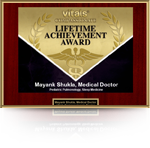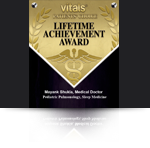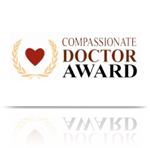Ready to Schedule an
Appointment with Dr. Shukla?
SLEEP DISORDERS
Sleep Disorders As Discussed by
NYC Sleep Doctor Mayank Shukla
Most adults have trouble sleeping at some point or another in their lives. While the occasional sleepless night are not considered a sleep disorder, without testing, you may not know how to identify a sleep disorder that requires treatment. Normal, healthy sleep is controlled by your body’s internal clock, a part of the brain known as the suprachiasmatic nucleus. The suprachiasmatic nucleus sits just above the optic nerve and is affected by exposure to light and exercise, which can reset the clock and move it forward or backward. If this sounds like it is something important to your sleep habits, that is because it is precisely that.
The regulation of our sleep patterns by the internal clock is what’s known as circadian rhythm. It’s the reason we wake up in the morning and sleep at night. However, there are a wide range of sleep disorders which can disrupt these normal patterns. If your sleep is regularly disrupted, it nearly goes without saying that you should seek a professional consultation. Please call (917) 746-3431 to schedule a consultation with Dr. Shukla today. He can diagnose your particular sleep disorder and put you back on the path to more restful sleep.
In case you are not sure if you have a problem sleeping, you need to know more about common sleep disorders. Let’s look at a few different types of sleep disorders and their causes to help you decide if it’s time to seek help.
Types of Sleep Disorders
Circadian Rhythm Disorders
Disruptions to your circadian rhythm can happen for a number of reasons. They are usually temporary and can be overcome with behavioral therapy, adjusting exposure to light, or with medications like melatonin (the natural hormone that makes you sleepy).
Common circadian rhythm disorders include:
- Jet Lag
- Shift Work Sleep Disorder: Caused by night shifts or rotating work schedules
- Delayed Sleep Phase Disorder: Falling asleep late and waking up late
- Advanced Sleep Phase Disorder: Falling asleep and waking especially early
- Non-24-Hour Sleep-Wake Disorder: The sleep cycle moves back farther each day
- Irregular Sleep-Wake Rhythm: Sleeping frequently and at irregular times throughout the day (usually more than twice)
Disruptions to the circadian rhythm can make it difficult to get up when you need to. Fortunately, these conditions are very treatable, especially with Dr. Shukla’s expertise and guidance.
Insomnia
Insomnia is such a common disorder that most people have at least heard of it. Insomnia makes it difficult for the affected person to fall asleep at night and can result in frequent waking throughout the night. The result is that people with insomnia frequently feel as if they didn’t get enough sleep. Insomnia can be the result of circadian rhythm disorders like jet lag, or may be caused by anxiety, stress, depression, poor sleeping habits, and/or certain medications.
There are two types of insomnia: primary and secondary. Primary insomnia means that the affected person is suffering from trouble sleeping, unrelated to any other condition. Secondary insomnia involves lack of sleep due to an another serious health problem, like depression, asthma, or cancer.
In addition to the two types of insomnia, patients may experience the condition either chronically or acutely. Short-term sleep problems may denote acute insomnia; long-term trouble sleeping typically indicates chronic insomnia. In either case, you will need to consult with your doctor to decide the best course of action to treat your insomnia.
Sleep Apnea
Sleep apnea is another common sleep disorder. When the upper airway becomes blocked – either because of a relaxing of the throat muscles or a disruption of sleep signals in the brain – your regular breathing pattern is interrupted during the night. This causes you to wake up periodically throughout the night, although you may not remember it. As a result, people with sleep apnea are often tired throughout the day. Sleep apnea is also associated with high blood pressure, heart attack, and stroke.
Pregnancy and Sleep Disruptions
Women who are pregnant typically experience sleep disruptions during the first trimester, third trimester, and following pregnancy. The causes are usually morning sickness, physical discomfort, and the needs of the child, respectively. Following childbirth, postpartum depression can also cause sleeplessness.
Narcolepsy
If you are frequently sleepy during the day, you may have narcolepsy. This brain disorder is occasionally genetic, although most people with narcolepsy have no family history of the condition. Research has linked some rare nerve disorders to the condition. Many people think of sleep attacks – uncontrolled sleep during the day – when they think of narcolepsy. However, most patients with this disorder never experience sleep attacks.
Restless Legs Syndrome
Middle-aged and older adults are the group most likely to develop restless legs syndrome. This condition causes discomfort in the legs throughout the night, leading to an urge to move the legs and feet throughout the night. This causes people with restless legs syndrome to have trouble falling asleep and may cause them to wake during the night. The causes of restless legs syndrome may include nerve disorders, kidney failure, vitamin / iron deficiencies, certain medications, and pregnancy.
Night Terrors
Children ages three to five are most likely to experience night terrors. Unlike nightmares, which occur during REM sleep, night terrors occur during non-REM sleep. Children who suffer from night terrors may wake up screaming but with no recollection of the frightening experience. Adults can sometimes experience night terrors, particularly those who are undergoing psychological or emotional problems.
Sleepwalking
Sleepwalking also occurs during the non-REM sleep stages. People who sleep walk may perform dangerous activities while sleeping, including leaving the house. Episodes of sleepwalking can last anywhere from 30 seconds to 30 minutes. The condition is connected to irregularities in the central nervous system, and is usually connected to a family history of the disorder.
Contact Brooklyn’s Sleep Disorder Center
Dr. Shukla can offer a range of treatments for whatever sleep disorder may have. To schedule your sleep disorder consultation at his New York offices, contact us today.Awards and Recognition
Dr. Mayank Shukla Top-Rated Pulmonologist 2018 - 2025
















